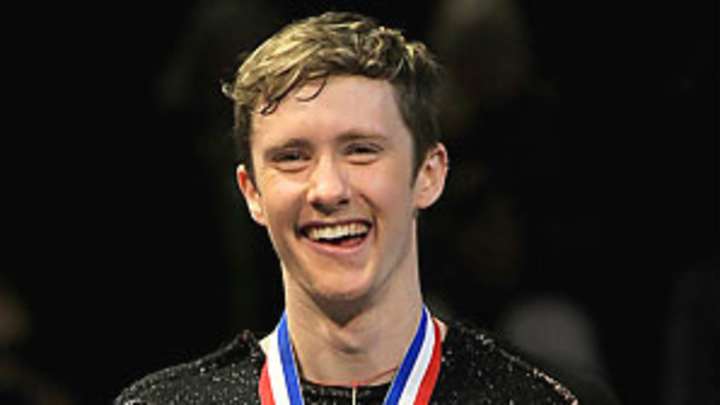Galindo's Hall of Fame snub more painful in his hometown

A plaque honoring him inside the building.
Rudy Galindo's dazzling 1996 performance that won him the U.S. men's skating championship is on the list of greatest sports moments to ever take place in the arena.
Galindo also makes the list of breakthrough American figure skaters in the past two decades.
That's why it's too bad that voters for the U.S. Figure Skating Hall of Fame didn't recognize the moment and induct Galindo into the sport's Hall of Fame this year. The voters should have honored Galindo in his hometown, where he broke barriers and changed perceptions about who can skate and what they're allowed to do.
"That's what hurt the most, that it was here," Galindo said of being overlooked by voters for the third straight year. "It would have been perfect...I feel like this is like my second home."
On Sunday, Galindo was in the audience for the men's long program and presented winner Jeremy Abbott with his championship trophy. The crowd that remained gave Galindo a nice ovation. And Galindo raved about Abbott's performance, calling it "breathtaking."
Abbott, whose stepfather had a convulsion during the performance and had to be hospitalized, won the men's title for the third time in four years. Abbott's victory wasn't exactly an upset. With both Evan Lysacek and Johnny Weir missing, Abbott was the most experienced skater. He cleanly landed a quadruple jump and skated with confidence.
"This time I was very confident that I would skate the way I did," Abbott said. "I feel very much more comfortable in my own skin."
It was a nice performance. But it didn't bring down the house the way Galindo did sixteen years ago. That year, Galindo was coming out of retirement and wasn't expected to do anything -- he wasn't even listed in the media guide. But his evocative program drew a standing ovation from the hometown crowd and wowed the judges, who awarded him the title over favorite Todd Eldredge.
That wasn't Galindo's only Hall of Fame-worthy accomplishment. He won two national pairs title with partner Kristi Yamaguchi, the only man in the modern era to win both pairs and singles titles.
Off the ice, Galindo was a breakthrough figure for skating. He is Mexican-American, raised in a trailer park in San Jose and struggled financially over the years to keep skating. Shortly before his '96 performance, he came out as a gay man - a revolution in a sport where homophobia remains closeted still. In 2000 he announced he was HIV-positive.
Galindo deserves to be in the Hall of Fame. Skating officials were so certain that he would be elected, they planned how to handle and market the event. But he failed to get the required 51 percent of the votes.
Throughout his competitive career, Galindo struggled to be accepted by the figure skating powers. So there's good reason to speculate that the old guard still doesn't want to acknowledge his accomplishments.
"It's always in the back of my mind, if I don't get selected to do something," he said. "That was my whole life growing up in amateur skating. I thought times have changed."
They have, somewhat, and Galindo helped change them. Weir came out a year ago and married his partner. Barriers have been broken. But homophobia still remains.
Galindo isn't bitter. He's still the same sweet guy who chose the biggest moment of his life -- the long program in 1996 -- to follow through on a promise to wave to one of his sister's young skating students (he said that Stephanie Ui recently contacted him on Facebook about the birth of her second child).
His health is good -- though he's a little concerned because his artificial ceramic hips -- he had bilateral hip replacement in 2003 -- have been recalled. His HIV is totally under control, thanks to the medication he's been taking daily for the past 12 years. No one knows better than Galindo how remarkable that particular breakthrough is: in 1989, Jim Hulick -- who coached Galindo and Yamaguchi -- died of AIDS-related illness. His older brother George also died of AIDS a few years later.
Galindo lives back in San Jose, teaching skating at the same rink where he once trained with his sister Laura. Galindo had a junior pairs competing this week.
He recently got a new client, Emma Hedican, the six-year old daughter of Yamaguchi and her husband, former NHL player Bret Hedican.
"She's a good skating mom," Galindo said of his former partner. "She makes sure Emma is all stretched and then goes on her way."
And he stays optimistic that one day he'll be recognized in the Hall of Fame.
"Maybe I'll get in next year in Omaha," he said.
Maybe. But it should have happened here, in his hometown.
